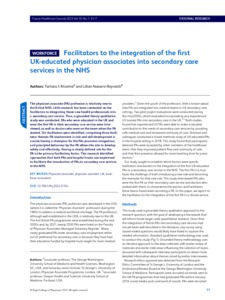Ritsema, TS; Navarro-Reynolds, L
(2023)
Facilitators to the integration of the first UK-educated physician associates into secondary care services in the NHS.
Future Healthc J, 10 (1).
pp. 31-37.
ISSN 2514-6645
https://doi.org/10.7861/fhj.2022-0104
SGUL Authors: Ritsema, Tamara Sue
![[img]](https://openaccess.sgul.ac.uk/116207/1.hassmallThumbnailVersion/Facilitators%20to%20the%20integration%20of%20the%20first%20UK-educated%20physician%20associates%20into%20secondary%20care%20services%20in%20the%20NHS.pdf)  Preview |
|
PDF
Published Version
Available under License ["licenses_description_publisher" not defined].
Download (221kB)
| Preview
|
Abstract
The physician associate (PA) profession is relatively new to the British NHS. Little research has been conducted on the facilitators to integrating these new health professionals into a secondary care service. Thus, a grounded theory qualitative study was conducted. PAs who were educated in the UK and were the first PA in their secondary care service were interviewed, as well as doctors who were on the team when the PA started. Ten facilitators were identified, comprising three facilitator themes: PA involvement in role and skill development is crucial; having a champion for the PAs promotes integration; and principled behaviour by the PA allows the role to develop safely and effectively. Having a clearly defined role for the PA is the primary facilitating factor. This research identified approaches that both PAs and hospital trusts can implement to facilitate the introduction of PAs to secondary care services in the NHS.
Statistics
Item downloaded times since 13 Feb 2024.
Actions (login required)
 |
Edit Item |



